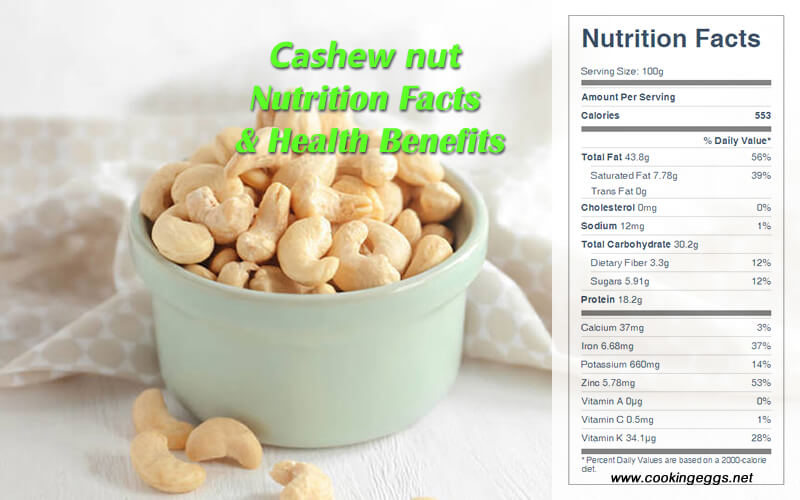Cashews Nutrition Facts & Health Benefits
Cashews are one of the most popular edible tree nuts. Cashew nuts can be eaten on their own, used in recipes, or processed into cashew cheese or cashew butter.
The nutritional value of cashews
Raw cashews are 5% water, 30% carbohydrates, 44% fat, and 18% protein.
In a 100 gram reference amount, raw cashews provide 553 calories, 67% of the Daily Value (DV) in total fats, 36% of protein, 13% of dietary fiber, and 11% of carbohydrates.
Cashews are high in dietary minerals such as copper, manganese, phosphorus, magnesium, thiamin, vitamin B6, and vitamin K. Iron, potassium, zinc, and selenium are present in significant amounts. 113 milligrams of beta-sitosterol are contained in 100 grams of raw cashews.

Raw Cashews Nutrition Facts Label
Health Benefits of Cashews
Cashew nuts are rich in oleic acid and linoleic acid, which can effectively prevent high blood lipids, coronary heart disease and other diseases. They can prevent atherosclerosis, cardiovascular disease, stroke and heart disease.
Like olive oil, cashews are high in healthy heart-protecting monounsaturated fats. Puréed in a food processor with a little walnut oil, they make a wonderful cashew nut butter.
They are rich in unsaturated fatty acids, like many other tree nuts, but cashews are specifically high in oleic (omega-9) and linoleic (omega-6) acid, flavonoids, anthocyanins and tannins, fiber, folate, and tocopherols.
They’re also a very good source of copper and a good source of magnesium, tryptophan, and protein. Cashews also contain some folic acid, potassium, and fiber.
Cashew nuts are rich in protein, and protein can increase our resistance, so eating cashew nuts can strengthen the immune system.
Cashews taste great, and they come with many anti-inflammatory, antioxidant, and antimicrobial benefits. Cashews have a direct effect on reducing inflammation and have been demonstrated to be beneficial for various diseases such as colitis and degenerative joint disease.
Several studies have identified that cashews can modulate inflammatory states such as colitis, degenerative joint disease, and others. The mechanisms responsible are the inhibition of the activities of 5-lipoxygenase or cyclooxygenase. This is the same mechanism by which many anti-inflammatory medications work.
An additional study assessed its effect in acute inflammatory events and found a significant decrease in pro-inflammatory cytokines and a significant increase in anti-inflammatory cytokines. In addition, there was also an increase in key antioxidant enzymes, which resulted in a reduction in oxidative stress. What these enzymes do is counter the formation of reactive oxygen species with less reactive molecules. In addition, the high content of vitamin E found in cashews contributes to its antioxidant capabilities. Cashews stimulate the production of all three of these enzymes, resulting in great antioxidant potential.
When we compare it to other tree nuts, cashews contain the highest amounts of phytosterols. Phytosterols are plant compounds that inhibit cholesterol absorption in the small intestine. This cholesterol-lowering benefit comes from nuts, specifically from cashews, given their higher content.
Health Risk: Cashew Allergies
Some people are allergic to cashews, but they are a less frequent allergen than tree nuts or peanuts. For up to 6% of children and 3% of adults, consuming cashews may cause allergic reactions ranging from mild discomfort to life-threatening anaphylaxis.
Cashew allergies are triggered by the proteins found in tree nuts, and cooking often does not remove or change these proteins. Reactions to cashew and tree nuts can also occur as a consequence of hidden nut ingredients or traces of nuts that may inadvertently be introduced during food processing, handling, or manufacturing, particularly in people of European descent.
The shell of the cashew nut contains oil compounds that can cause contact dermatitis similar to poison ivy, primarily resulting from the phenolic lipids, anacardic acid, and cardanol. Due to the possible dermatitis, cashews are typically not sold in the shell to consumers.